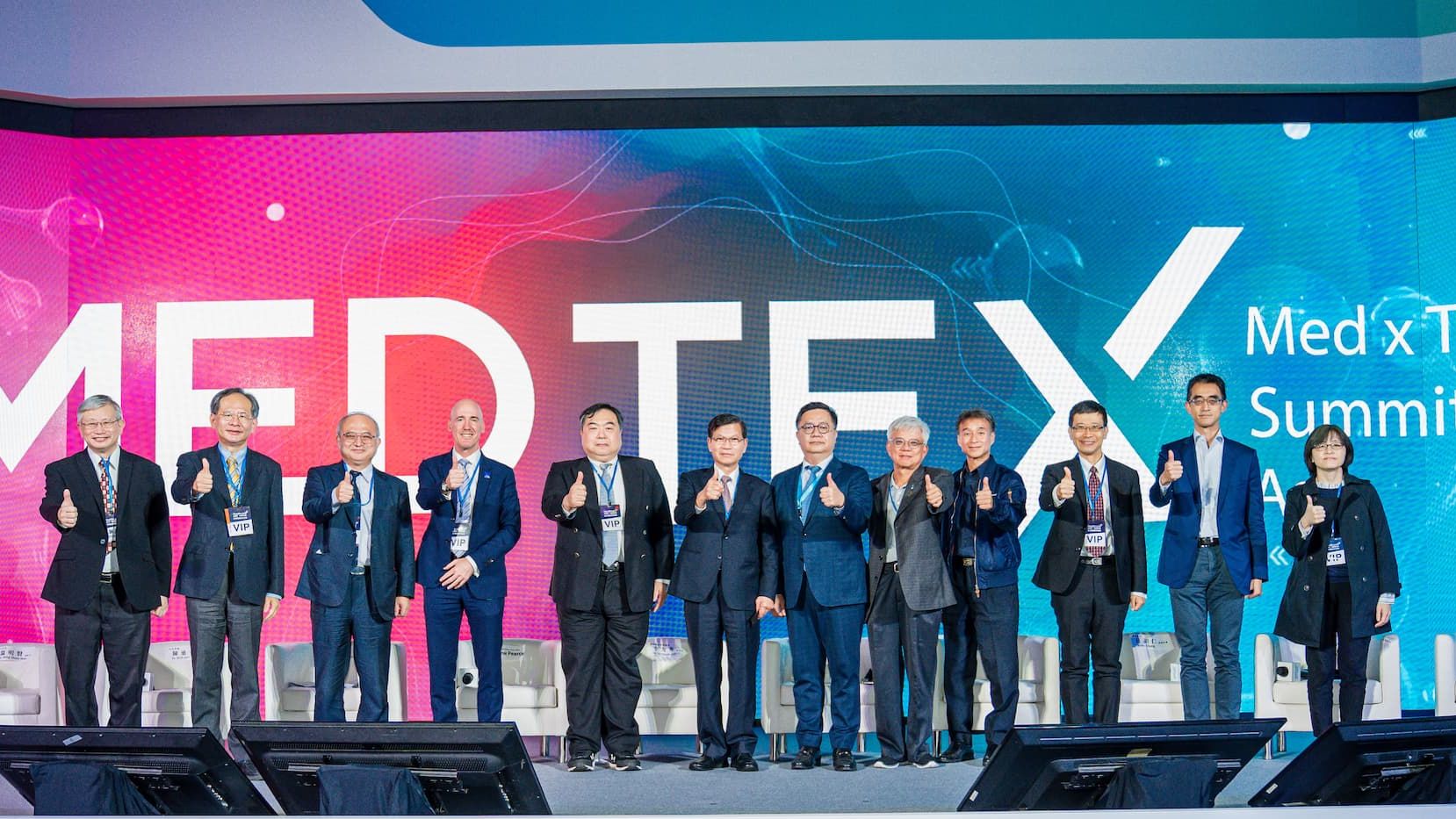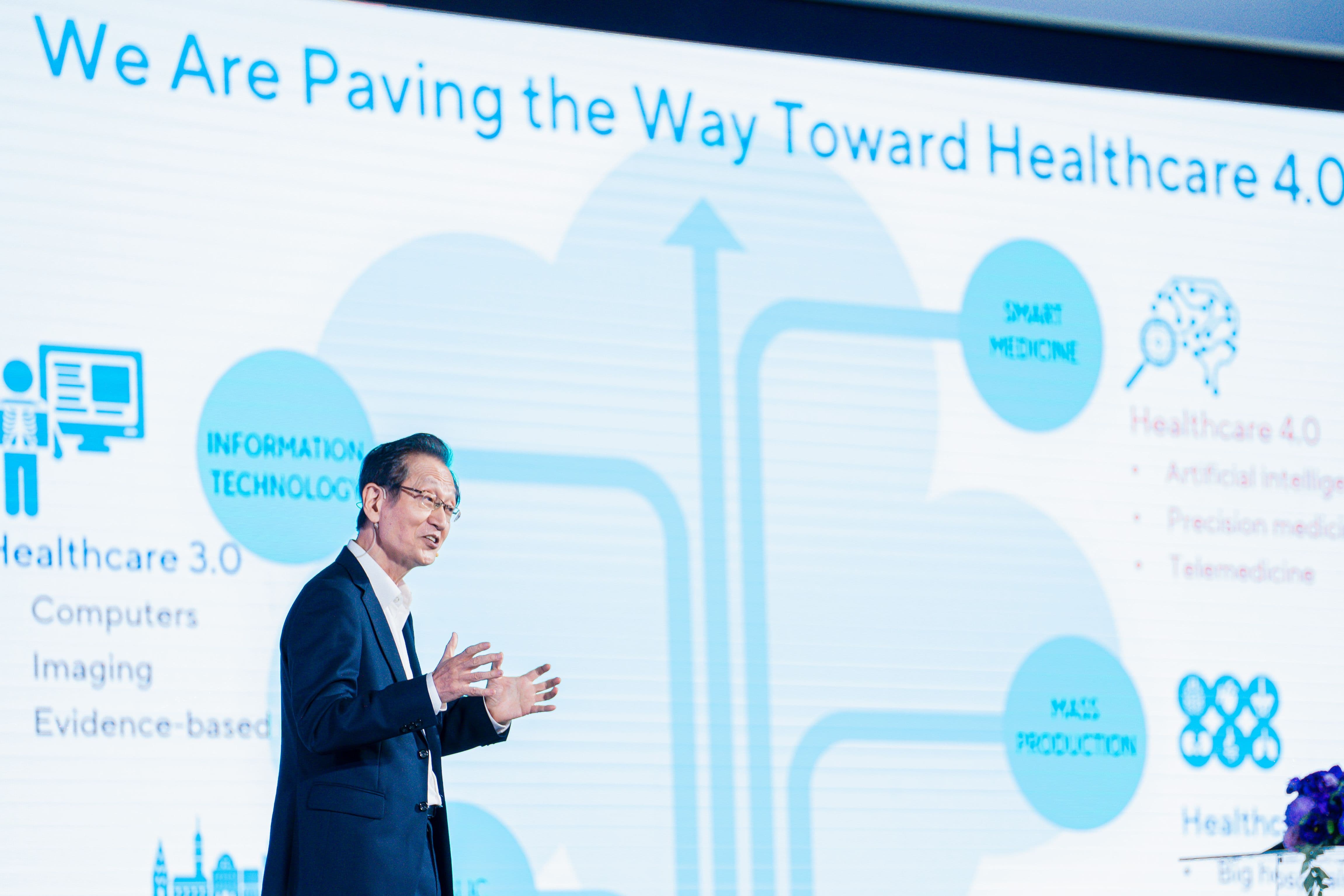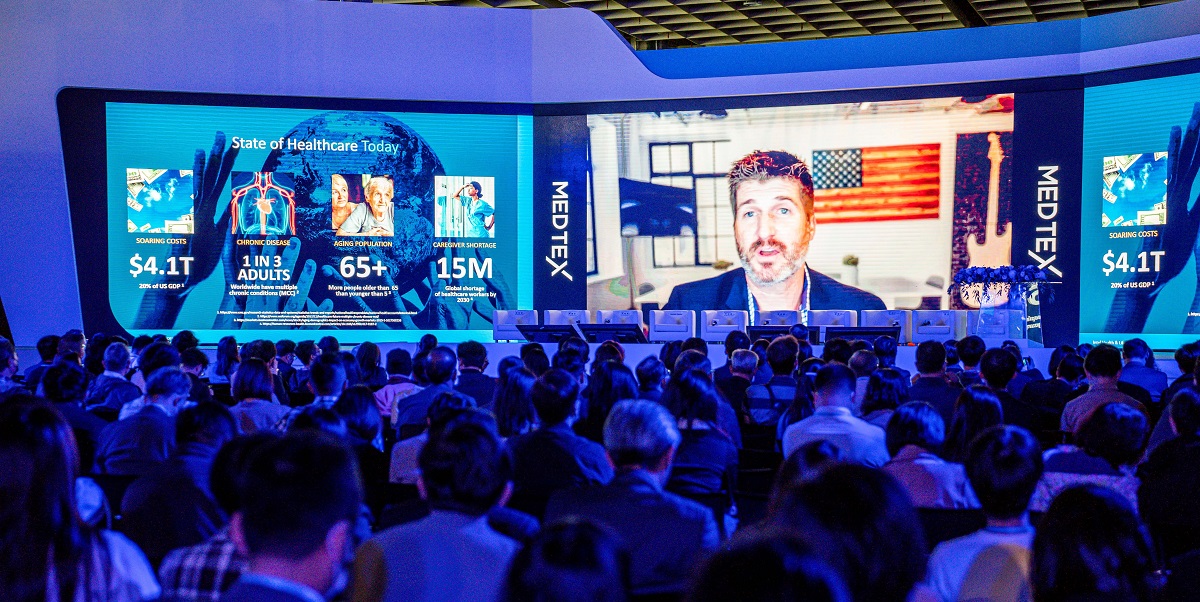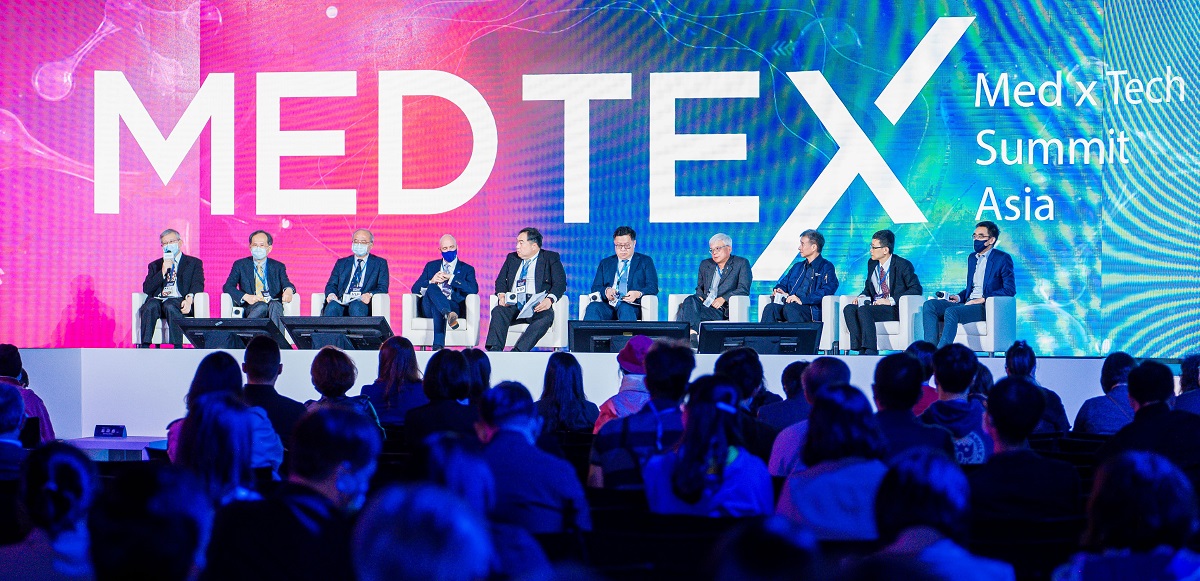
《GeneOnline》MedTex Summit Asia 2022 – Revolutionizing Smart Healthcare with Next Generation Technologies
2022-12-22

In this photo, left to right are: Ming-Shien Wen, Vice Superintendent, Chang Gung Memorial Hospital, Linkou; Shih-Ann Chen, Superintendent, Taichung Veterans General Hospital, Taipei, Taiwan; Ming-Shiang,Wu, Superintendent, National Taiwan University Hospital; Andrew Pearce, Vice President Analytics & Global Advisory Lead, Healthcare Information and Management Systems Society (HIMSS); Yu-Chuan Jack Li, President of the International Medical Informatics Association (IMIA); Chi-Huey Wong, President,Institute for Biotechnology and Medicine Industry (I.B.M.I.); Ted Chang, CTO, VP&GM, Quanta Computer; Ted Hsu, Vice Chairman, ASUSTeK; Brian Chong, Vice President, Wistron Medical Technology Inc.; Eric Chang, Partner Director, Technology Strategy, Microsoft Research Asia; Eugene Chang, Managing Director, Oracle Taiwan; and Yueh-Ping Liu, Director-general, Dept. of Medical Affairs, Ministry of Health and Welfare
Source: GeneOnline
As one of the main forums of 2022 HealthCare+ Expo Taiwan, the 5th MedTex Summit Asia 2022 brought together leading experts in information technology, telecommunication, biotechnology, medical technology and healthcare services to share their insights and recommendations on the development of smart hospital technology.
Powering Smart Healthcare by AI Technologies
The first keynote speech of the forum was delivered by Jonney Shih, Chairman of ASUSTeK Computer Inc. (ASUS) with the theme “Healthcare 4.0: The Way to Realize Future Care”, illustrating ASUS’ milestones and future plans towards “Smart Healthcare 4.0”.
According to Shih, ASUS is actively constructing the “Smart Healthcare Cyber-Physical System (CPS)” to develop a three-layer architecture of next-generation, cross-hospital smart healthcare digital infrastructure, smart healthcare digital platform, and smart healthcare digital applications to implement precision healthcare, virtual care, healthcare big data, electronic health records and community health management to create a more agile and resilient healthcare system. Besides that, many big data and artificial intelligence (AI) technologies have been used in vaccine development during the pandemic, accelerating the digital transformation worldwide. With new digital technologies, precision health can be achieved through more precise diagnosis, personalized medicine and risk management.
In recent years, ASUS has continued to focus on AI forward-looking algorithms, rooted in strong software and hardware integration capabilities, to assist medical diagnosis and improve the operational efficiency and overall quality of Taiwan’s healthcare providers. Today, ASUS has over 20 hospital partners in Taiwan, including the Taipei Municipal Gan-Dau Hospital, the first to feature an advanced cloud-based medical record system.
As Taiwan is moving towards a super-aged society, the elderly population continues to increase and the demand for community health care is urgent. The iHARP (innovative, intelligent, individualized Healthy Aging & Rejuvenation Platform) is developed by ASUS in collaboration with National Yang Ming Chiao Tung University and Taipei Municipal Gandau Hospital. The platform uses 5G transmission technology and cloud technology to gather hospital health data, community activity data, and personal health data, along with AIoT devices and AI algorithms to help the community hospital transform into a “future hospital” and develop community health management.

Jonney Shih, Chairman of ASUS, delivered his keynote speech “Healthcare 4.0: The Way to Realize Future Care”
Innovations Leading to Smart Hospital Evolution
Intel Corporation's Brad M. Haczynski, Senior Vice President and General Manager – Network and Edge Global Sales, delivered a keynote speech virtually about Intel's role in advancing healthcare technology. He also shared how semiconductor technology is helping to create the next generation of smart hospital technology and reshape the medical industry.
Concerning the current state of healthcare, the yearly expense in the US alone has soared to $3.8 trillion and the figures are expected to keep rising. Additionally, nearly one in three adults worldwide suffer from multiple chronic conditions (MCCs), and such patients are prone to complications and higher treatment costs. Moreover, for the first time in human history, there are more people over the age of 65 than under the age of five. These demographic challenges are expected to lead to a global shortage of 15 million healthcare workers by the year 2030. As a result, Haczynski expressed his grave concern about these issues and stressed the importance of transforming the healthcare industry from a highly reactive industry to one that is proactive and predictive.
According to Haczynski, Intel's global health and life sciences team focuses on three major areas to bring about breakthroughs and change people's lives around the globe. Firstly, Intel is dedicated to powering smart hospitals and improving patient outcomes by enabling powerful and efficient healthcare data processing, networking, and data transfer from the edge to cloud for optimized workflow. Secondly, Intel is engaged in accelerating scientific discovery by powering solutions that range from lab automation to clinical chemistry, mass spectrometry and genomics. Many biotech and pharmaceutical researchers are relying on Intel technology to help discover new treatments and vaccines, conduct clinical trials and scale smart manufacturing processes for life changing products.

Intel Corporation’s Brad M. Haczynski shared about innovations that reshape the healthcare industry
Accomplishing Patient-first Smart Healthcare System
Peter Williams, Executive Director Healthcare Industry of Oracle JAPAC, followed to share about the importance of digital health platforms in supporting the sustainable healthcare ecosystem.
Oracle is developing a digital health platform powered by highly secure, highly performant and reliable Cloud native applications. Patients can be benefitted by such a system as they experience improved outcomes and easy access to their digital medical records, while healthcare providers can be aided by real-time and seamless systems.
The company is also leveraging AI to revolutionize wellbeing checks with Oracle Cloud Infrastructure by providing conversational AI calling service through land-line or mobile phone, asking patients about their health conditions and wellbeing. On the other hand, Oracle technology, including the Oracle Healthcare Data Repository, plays a core role in the development of the My Health Record system in Australia. The system is a summary of key health information which healthcare providers need to exercise their clinical judgment. Over 22.8 million health records nationwide are currently maintained My Health Record, involving more than 2.6 billion documents.
Digital Transformation of Healthcare
David Rhew, Global Chief Medical Officer and Vice President of Healthcare of Microsoft, mentioned in his speech about the future development of digital transformation, breakthrough developments of Microsoft Technology and collaboration opportunities with hospitals in Taiwan.
The latest quantitative AI enables more effective analyses of diagnostic images that can look for different nodules, calcifications, and other observations that may be valuable in monitoring tumor growth. Moreover, clinical findings acquired from researchers worldwide can be curated using Microsoft AI, which is able to go through all those publications and help researchers triage the literature, allowing more effective review and interpretation.
Microsoft AI can also assist more accurate prediction of right treatments for different patients according to their respective gene mutations. Furthermore, with voice AI technology, doctors can capture voice data to create progress notes that can be integrated into digital medical records.
Concerning potential collaborations in Taiwan, Microsoft is looking forward to further development in fields such as data sharing and security, further applications of AI as well as commercialization.
Moving Forward into the Future
The forum was concluded by a panel discussion chaired by Dr. Ted Chang, Chief Technology Officer (CTO), Vice President and General Manager of Quanta Computer, and Prof. Yu-Chuan Jack Li, President of the International Medical Informatics Association (IMIA). The panelists exchanged views on ways of bringing Taiwan's medical innovation to the international market, aligning Taiwan’s next generation of smart medical technology with international standards, and making Taiwan the first choice for partnerships to develop smart hospitals.
The panel included superintendents from several major hospitals in Taiwan, and they shared several groundbreaking applications of novel medical technologies, including clinical care and physical examination assisted by medical voice AI, AI models that can greatly increase the speed of gene sequencing, as well as 5G medical imaging applications that allows high-speed transmission of diagnostic images and the development of mobile consultation system.
The panel members agreed that Taiwan enjoys excellent capabilities in information and communication technology, and the next step of development will focus on crossing over with hospitals and other usage scenarios. With the integration of technology, AI, and smart hospitals, it is anticipated that the healthcare ecosystem can be revolutionized in the future.

In this photo, left to right are: Ming-Shien Wen, Vice Superintendent, Chang Gung Memorial Hospital, Linkou; Shih-Ann Chen, Superintendent, Taichung Veterans General Hospital, Taipei, Taiwan; Ming-Shiang,Wu, Superintendent, National Taiwan University Hospital; Andrew Pearce, Vice President Analytics & Global Advisory Lead, Healthcare Information and Management Systems Society (HIMSS); Yu-Chuan Jack Li, President of the International Medical Informatics Association (IMIA); Ted Chang, CTO, VP&GM, Quanta Computer; Ted Hsu, Vice Chairman, ASUSTeK; Brian Chong, Vice President, Wistron Medical Technology Inc.; Eric Chang, Partner Director, Technology Strategy, Microsoft Research Asia; and Eugene Chang, Managing Director, Oracle Taiwan